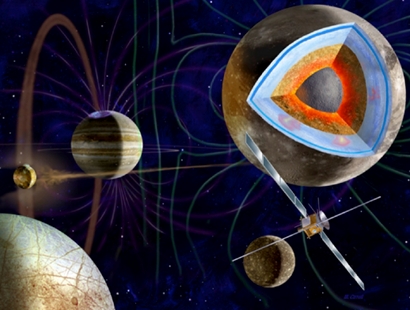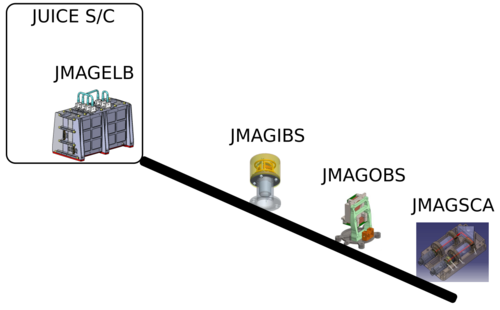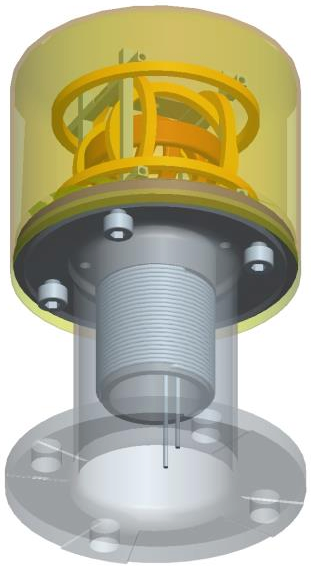
JUpiter ICy moons Explorer (JUICE) is a mission to explore Jupiter environment focusing on its moons Ganymede, Callisto, and Europa in order to investigate the evolution of habitable worlds around gas giants. JUICE is a European Space Agency (ESA) L-class mission as part of ESA's Cosmic Vision 2015-2025 programme. It successfully launched into space on April 14, 2023, and will arrive in the Jupiter system in 2031. Then a three and a half years-long study period will begin with exploration of the Jovian atmospheric structure, composition, and dynamics. Europa flybys period will follow focusing on geology and composition. Before the transfer to final Ganymede observations, also the internal structure, surface and exosphere of Callisto will be closely examined. The final phase of the mission is dedicated to Ganymede. This final period is a high priority phase for magnetic field observations, as they can provide valuable information about the interior of the Ganymede via investigations of the interaction of Ganymede intrinsic magnetic field with the Jovian magnetosphere.
The Juice spacecraft is being developed under the Airbus Defence & Space company in France as a prime contractor that will provide the spacecraft itself with all the supporting services: spacecraft control; power; thermal control; communication, providing therefore a platform for 10 scientific instruments

J-MAG, the JUICE magnetometer package is being developed by a consortium of European universities and scientific institutes lead by principal investigator Prof. Michele Dougherty from Imperial College London and the Institute of Geophysics and Extraterrestrial Physics of the TU Braunschweig and the Space Research Institute in Graz as prime contributors. J-MAG will study the interaction between Ganymede's intrinsic magnetic field and Jupiter's magnetosphere to help determine the depth and extent of the ocean as well as understand the source of Ganymede's intrinsic field. J-MAG will also significantly contribute to the understanding of the overall plasma processes within the Jovian magnetosphere and on Jovian other moons: Europa and Callisto.
The J-MAG instrument package consist of the following sub-units
Furthermore, radiation modeling of the whole instrument in order to evaluate high dose radiation effects expected at Jupiter is provided by the University of Leicester.

The JMAGIB, the inboard magnetic sensor, is developed at the Institute for Geophysics and Extraterrestrial Physics (IGeP) of the TUBS and the electronics development is subcontracted to Magson GmbH. JMAGIB is a fluxgate magnetometer dedicated to measure the three components of the magnetic field. This kind of magnetometer has a long heritage at IGeP from previous space missions such as THEMIS (NASA), Venus Express (ESA), ROSETTA (ESA), or recently MASCOT (DLR/CNES). The magnetometer consists of a sensor head and an electronics board. The electronics is placed inside J-MAG common electronics box, while the sensor itself is mounted on the spacecraft boom dedicated to J-MAG and RPWI sensors. The JMAGIB sensor contains two ring core elements of high-permeability material for the magnetic field concentration. Around the ring cores, excitation coils are wound, that are necessary for core saturation - basics of fluxgate principle of operation. Second set of coils - three axis sensing coil system - picks up the induced signal. In order to keep the sensor in linear regime and avoid the need of range switching, Helmholtz coil system provides the feedback and keeps the sensor in near zero field. Information about the ambient magnetic field is then extracted from the signal using both input and feedback values. The sensor structure is covered with a multi-layered insulation (MLI), which in addition of an internal heater provides a thermal control of the sensor.
Vacancies of TU Braunschweig
Career Service' Job Exchange
Merchandising
Term Dates
Courses
Degree Programmes
Information for Freshman
TUCard
Technische Universität Braunschweig
Universitätsplatz 2
38106 Braunschweig
P. O. Box: 38092 Braunschweig
GERMANY
Phone: +49 (0) 531 391-0
